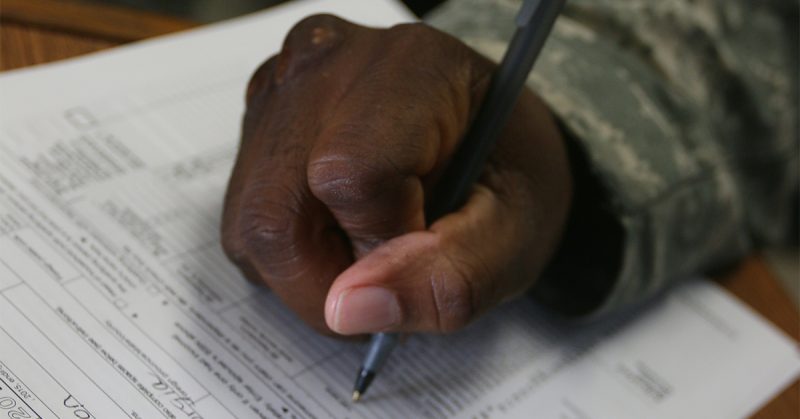 Howdy, y’all! My name is Mindy Dulaney, and I have been a proud Army spouse for 16 ½ years. My husband is LTC David Dulaney—an Army JAG and the current Executive Director of the Armed Forces Tax Council. You caught that, right? Tax Council! How exciting do you think our dinner conversations are? I know more about taxes than the average military spouse (don’t be jealous).
Howdy, y’all! My name is Mindy Dulaney, and I have been a proud Army spouse for 16 ½ years. My husband is LTC David Dulaney—an Army JAG and the current Executive Director of the Armed Forces Tax Council. You caught that, right? Tax Council! How exciting do you think our dinner conversations are? I know more about taxes than the average military spouse (don’t be jealous).
As military spouses, there are a few statements that cut right to our core. For example:
- Deployment orders
- PCS
- Billing zip code
- Clearance renewal
- Waiting for orders
- Disconnecting your cable/internet (no, you cannot put me on hold)
- Re-connecting your cable/internet (no, you cannot put me on hold AGAIN)
- Legal State of Residence
- Tax time
No one likes doing his/her taxes. Well, maybe my husband does, but he is a tax lawyer after all. Add the unique situations and intricacies of military life, and filing your taxes can become about as fun as an OCONUS PCS. But, my friends, a new law has passed to make filing your state taxes a little less painful.
First, some background. Let’s tell a little story, one that you all know well. Enter me, a starry-eyed, brand new Army spouse in 2002. We were married and stationed in Texas (the best state ever), which was “home” to both of us. Along came the orders, and off to Fort Benning, Georgia, we went. You all know what came next…long lines at the DMV, getting my driver’s license changed, registering to vote, and all that fun stuff that officially made me a Georgia Peach. When tax time came along, I had to pay Georgia state taxes on any income I made while living in Georgia, because no matter how often I wore my boots and cowboy hat and told y’all I was fixin’ to do something, I was legally a Georgia Peach.
The next batch of orders arrived, and we were off to Virginia this time. Again, I headed to the DMV, changed my driver’s license, registered to vote, and all that other time-consuming stuff, which is oh-so-convenient to do with toddlers in tow (because it’s not like you’ve found any babysitters in your new place yet, right?). Tax time came along, and this time I had to pay Virginia state taxes on any income I made while living in Virginia.
By now, I was getting pretty fed up with this “state tax” thing. I’m from Texas, remember? And one of the (many) reasons it’s the best state ever is because it doesn’t have a state income tax. My active-duty service member husband got to remain a Texas resident and didn’t have to pay state income taxes on his military pay. So why did I have to keep paying these other states’ income taxes? You see, my husband was protected under the Servicemembers’ Civil Relief Act or SCRA. He did not have to abandon his home state of Texas when he PCS’d to a new state; he got to keep his “legal residence or “domicile” because he only left Texas due to military orders and he, as most Texans will say, intended to return to Texas as soon as he separated from the Army. Thus, neither Georgia nor Virginia could tax him, as he was not a resident.
So, long story short, my husband could stay a Texan and I couldn’t. Well, I guess some legislators finally realized our struggles, because about that time a new law was passed. In 2009, the Military Spouse Residency Relief Act, or MSRRA, extended those same SCRA residency protections to military spouses. Now, it wasn’t all hearts and flowers. The MSRRA gave the military spouse similar state tax residency protections as the service member, if, and only if, they had the same legal residence upon PCSing and were living together in the new state (the “Same State” rule).
As you can see, MSRRA really helps couples who were both residents of the same state when they first joined the military or were lucky enough to PCS back to the service member’s state of legal residency. But for many military spouses, it wasn’t much help. The “Same State” rule prevented them from being able to keep their residence in a state other than the one in which they were currently stationed. Many military spouses therefore had to keep paying and filing state income taxes in a different state than their service member, which cost these military families lots of time and money.
That gets you up to speed to today, and back to my original tease that your state taxes may be easier to file now. Pay attention, here comes some more legal talk. Congress just passed the Veterans’ Benefits and Transition Act, or VBTA, which allows military spouses to elect, for state tax purposes, residency in the same state as their active-duty service member spouse for the 2018 tax year (January-December 2018) and for any future taxable years. Even if you have never been a legal resident of that state, if your spouse is active duty, you can now choose the same state as your spouse’s “legal state of residence for the purpose of filing your state income taxes. This is especially awesome if, for example, you are currently stationed at Fort Drum, New York (a very high-income tax state), and your spouse’s legal state of residence is Texas (one of just a few states that does not have a state income tax).
Here is an example of how the VBTA can work:
An active-duty member who is a legal resident of Texas (a non-income tax state) is stationed at Fort Drum, New York (a high-income tax state). While there, the member marries, but soon PCS’s to the Pentagon in Virginia (another high-income tax state). The member’s spouse moves to Virginia with the member, but has never lived in Texas; however, the spouse can elect Texas as her state of legal residence and will no longer have to pay state income taxes to Virginia or any other state they PCS to. Because the SCRA would have already protected the service member from paying Virginia income taxes, the total effect of the VBTA-amended SCRA would be to likely free this couple from paying any income taxes to any state for as long as the member remained on active duty in the armed forces and they were married to each other.
Keep in mind that all the states are going to take a while to figure out how to apply this new VBTA, just as you will likely need time to figure it out, too. Military couples should consult with their installation legal assistance office before choosing their state of legal residence and filing their state and local tax returns. Military OneSource can help you find your legal assistance office for free legal advice.
Talk to your military legal assistant attorneys (it’s not too bad, I do it every night) and take advantage of this new law if you can. Military OneSource has awesome tax resources, too. Tax Day is April 15, 2019. It’ll be a party in the Dulaney home!





How does the spouse elect their state of legal residence for 2018? Do they just file a return for that state or do they need to fill something out?